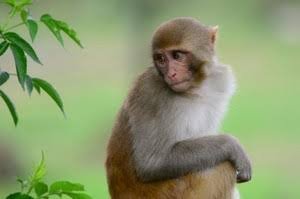Monkeys

Monkeys are a term for all nonmemory primates ("pre-ape", such as lemurs and tarsiers) or apes, both in the Old World and the New World. Until now known 264 species of monkeys that live in the world. Unlike apes, monkeys are typically tailed and smaller in size. Monkeys are known to learn and use tools to help him get food.
The grouping of monkeys is parafiletic, since the Old World monkey (Cercopithecoidea) is actually closer to its genetic kinship with apes (Hominidae), than the New World monkey (Platyrrhini).
The biggest monkey is mandrill. Some monkeys in everyday language are also often referred to as apes.
Some monkeys have been exploited by humans as animals or animals to aid in daily work. Long-tailed monkeys (Macaca fascicularis) are the animals most commonly interacting with humans and often kept as pets, circus animals, or laboratory experiments. He is also the first primate ever to outer space. The bears are kept in several places in Sumatra and Malaya to be trained as coconut pickers.
The monkeys in the forest of Bunder mount the trees during the day, leaping from one branch to the other and silent when there are mountaineers passing by. Maybe there monkeys live side by side with tiger roots and snakes. In West Sumatra, precisely Lake Maninjau, adjacent lodging with woods and monkeys can easily climb the pohondan into the hotel terrace near the swimming pool. On the way up and down towards the lake Maninjai, monkey monkeys freely wandering and like waiting for food dilepmar by travelers.